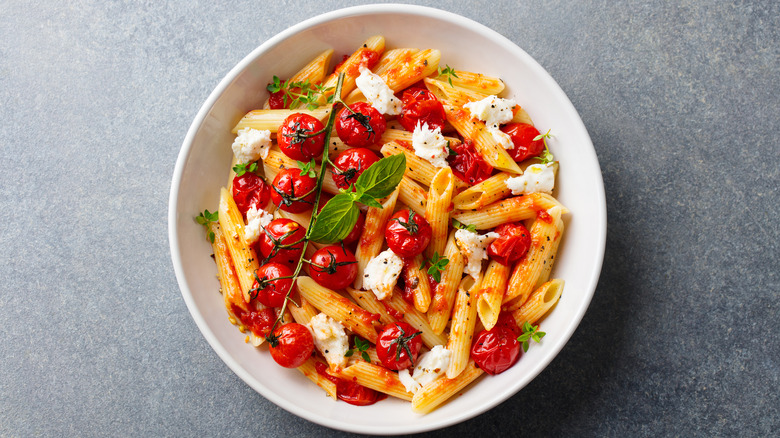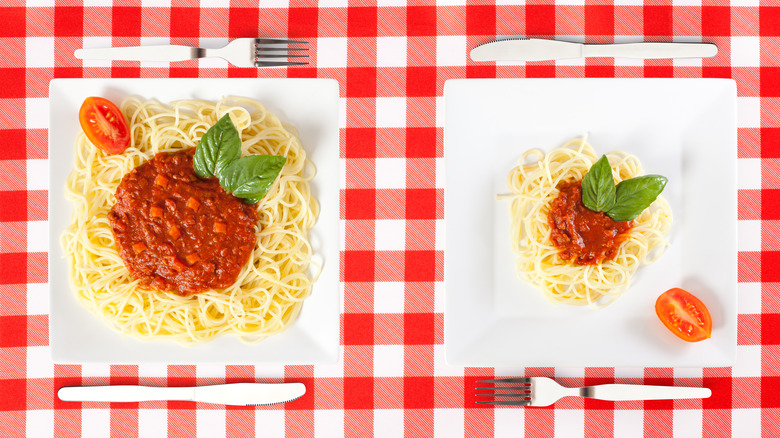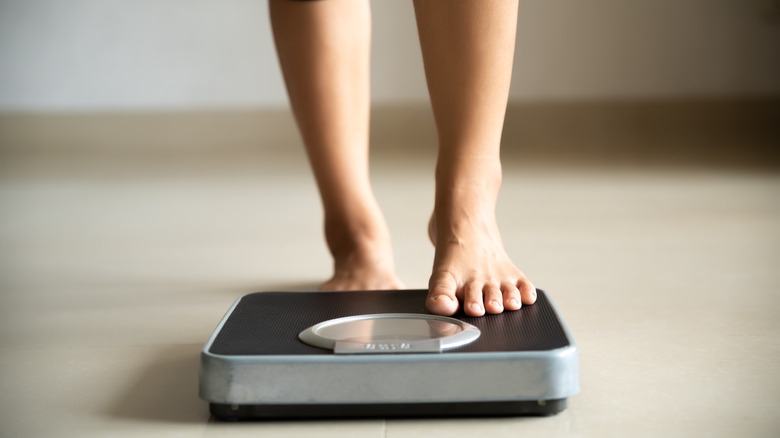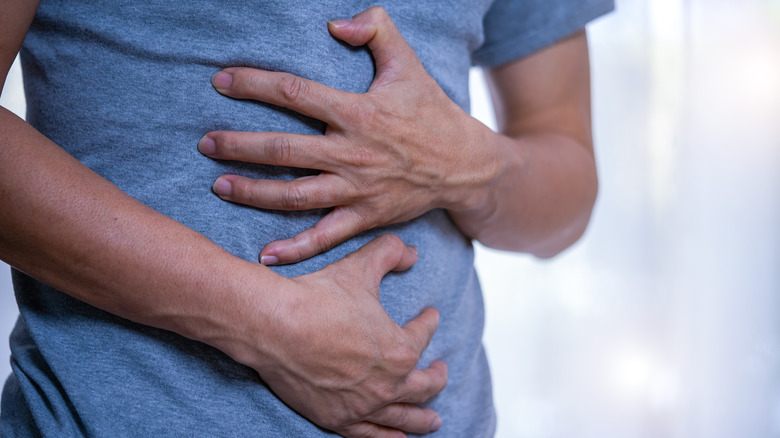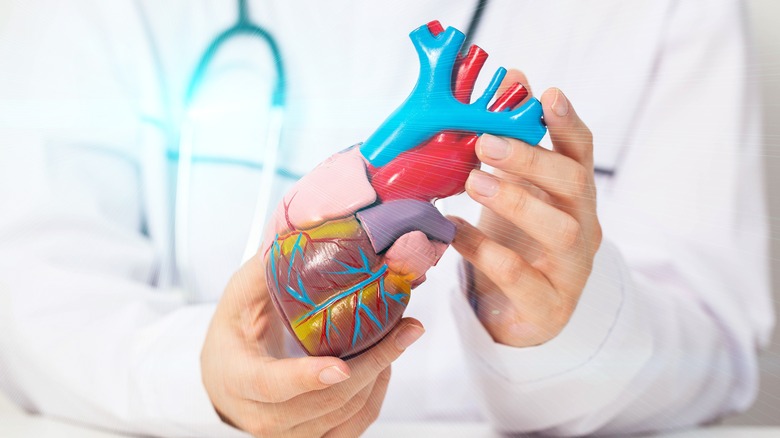The Effects Of Eating Too Much Pasta, According To Health Experts
We all know that too much of anything is rarely good. Especially when it comes to food, having a surplus of any kind can lead to overeating, which then stands to cause a whole slew of problems. So, it's important to keep a good balance with the foods you eat, as our bodies need many different types of foods to stay properly nourished and healthy.
Pasta is a delicious kitchen staple that can be made in a variety of ways, not to mention a wide variety of different shapes. Classic hot pasta dishes spaghetti with meatballs (maybe amped up with the use of a Instant Pot) practically always hit the spot, for instanced. Meanwhile, a cold, vegetable-enriched pasta salad is the perfect meal for a summer picnic. Macaroni and cheese can be the best comfort food after a hard week. But have you ever wondered what all that pasta may be doing to your body if you have too much?
This article is not meant to demonize or scare you away from pasta, of course. Ultimately, carbohydrates are an important nutrient that your body definitely needs. After speaking with a variety of experts, we have uncovered some of the information that you'll want to know about eating too much of this beloved food. Rest assured that you can still enjoy your favorite pasta dishes, as this article will help you make the sort of choices that can allow you to enjoy pasta while keeping things healthy. Here's what we found.
How much pasta is too much?
Many people may have a skewed perception of serving sizes based on their eating history, knowledge of nutrition labels, and emotional relationship with food. Having a basic understanding of appropriate serving sizes can help you eat in a healthier way. The average serving size of cooked pasta is about one cup, or about the size of a tennis ball. That usually translates to about half a cup of dried pasta. In that one cup of pasta, there are about 43 grams of carbohydrates and 221 total calories. Yet, when you think back to all of the pasta meals you've eaten at restaurants, that restaurant serving size was likely far bigger than the size of a tennis ball!
Now, having more than a serving size of pasta in a day is completely fine and can fit into a healthy diet with some careful thinking. In fact, the FDA recommends 275 grams of carbohydrates per day for an adult following a standard 2,000 calorie diet. However, Dr. Michael O. McKinney, physician and certified nutritionist, shared that this can vary from person to person. "The amount of 'too much' pasta varies based on an individual's nutritional needs and lifestyle," he said. Ultimately, some people need fewer than 275 grams of carbohydrates and some may need extra. Moreover, you should be getting your daily carbohydrates from multiple sources and not just pasta.
Too much can cause weight gain
One of the first things that people surely think of when it comes to overdoing it on pasta or carbohydrates is weight gain. As Mayank Pandey, dietician and founder of Healthroid shared, "Excessive consumption of pasta, which is high in carbohydrates, can lead to weight gain if not balanced with physical activity. The body may store the excess carbohydrates as fat, contributing to an increase in body weight over time."
Especially with the recent popularity of low-carb diets, it's common for people to cut out pasta completely from their meal repertoire. It's also important to remember that, on many occasions, pasta isn't eaten by itself, but with butter, oil, sauces, and other additions that can increase calories and lead to weight gain (especially if it is high in carbohydrates and fat). "Consuming excessive pasta can contribute to significant weight gain if your overall caloric intake exceeds the body's energy expenditure," summarized Jacek Szymanowski, a certified nutritionist and health coach.
So, what to do? You don't necessarily need to cut out all pasta, especially if it's part of a balanced diet and exercise habit. Pandey shared that the best way to prevent overeating and subsequent weight gain is to listen to your body's hunger cues. Studies like this 2016 paper that was published in the Journal of the Academy of Nutrition and Dietetics have shown that taking the time to slowly chew and enjoy your meal with limited distractions can help you to slow down and pay attention to those cues (which is why eating while watching TV is a ready way to overdo things).
Pasta may feed bad bacteria in gut
White pasta is a refined carbohydrate, meaning the wheat has been processed to the point where it loses much of its nutritional value and has less fiber than its unrefined counterparts. Choosing white pasta versus whole wheat pasta also likely means you'll be consuming fewer vitamins and minerals (though enriched pastas are common).
Our bodies need fiber for optimal gut health, as fiber helps feed helpful bacteria in the gut and helps to limit the growth of harmful bacteria that can cause illness — presenting a potential issue if you're eating fiber-poor pasta. Additionally, the refined carbohydrates in some pastas are turned into glucose very quickly, allowing potentially harmful bacteria to thrive and create a vicious cycle of sugar cravings and poor gut health.
If you continue to fill your diet with high amounts of white pasta, you aren't giving your body the chance to have enough fiber or whole grains to promote a healthy gut microbiome. Instead, save room for food that encourages the proliferation of good bacteria in the gut — like fruits, veggies, and whole grains, perhaps in the form of a produce-rich summer pesto pasta salad.
Refined pasta may raise your cholesterol
Low-density lipoprotein, or LDL, cholesterol, is the kind of cholesterol that can build up in your arteries, causing health complications like arteriosclerosis, stroke, and heart attacks. The levels of cholesterol in our blood is directly affected by our diets and lifestyle choices, so gaining an awareness of what you choose to eat and how it can affect your cholesterol is very important. That definitely includes pasta.
Pandey shared that "a diet high in refined carbohydrates like pasta can negatively impact heart health by raising levels of bad cholesterol and increasing the risk of heart disease." This happens with white pasta in particular because of the high levels of carbohydrates paired with low amounts of fiber in the food. If you either have oversized portions or eat white pasta regularly, your cholesterol levels are likely to rise. On the other hand, more fiber-rich whole wheat pastas can actually do the opposite and lower cholesterol. If you have the choice, always opt for the whole wheat pasta and be sure that you're taking on a reasonable serving size.
Pasta can cause energy crashes
Have you ever struggled with eating what you thought was a great lunch, only to feel completely depleted of energy shortly after? This is quite possibly due to dramatic changes in blood sugar. When our blood sugar is too high or too low, it causes fatigue and other side effects, such as difficult concentrating. This can happen easily if you eat many carbohydrates in one meal or don't effectively your carbohydrates with protein and fat. According to McKinney, pasta's "carbohydrate content makes this happen but too much consumption can lead to highs and lows in blood sugar which will eventually affect energy levels and fatigue may be experienced as a result."
Being aware of portion sizes will help you avoid that dreaded mid-day energy crash. You can also supplement your pasta with something that contains protein and fat, like chicken and olive oil, which will can help keep your blood sugar balanced.
There are some exceptions. Eating a lot of pasta in one sitting can be beneficial if you are about to undergo a high level of exertion. This is because the body will use carbohydrates as the main source of energy in the short term, so the carbohydrates will be used relatively quickly and productively. This is often called carb-loading, a popular technique amongst athletes. But unless you're preparing for a race or heading off to compete in the Olympics, it is more likely that you'll want to stick to a balanced pasta meal.
Too much pasta may lead to hormonal imbalances
Dr. Varsha Khatri, Registered Dietician, explained to us that eating too much pasta "can eventually lead to metabolic syndromes such as type II diabetes." Insulin is a hormone produced by your pancreas and which is directly related to the amount of carbohydrates that we eat. When the blood sugar rises (quick blood sugar spikes can be brought on by ingesting high levels of refined carbohydrates in pasta), your body will create more insulin to bring those levels back down. Regularly eating high levels of refined carbohydrates has been linked to insulin resistance, where the body cannot produce enough insulin on its own. Too much insulin resistance and type II diabetes may very well rear its head. As Szymanowski warned, "High insulin levels driven by excessive carb consumption can lead to insulin resistance, metabolic syndrome, and potentially type 2 diabetes." Diabetes, especially if it isn't managed, can lead to very serious health complications like stroke and heart attack.
It's not all about insulin, though. When we eat carbohydrates, our body releases serotonin, which can boost your mood. This is why so many people enjoy eating pasta — it makes them feel happy. The negative effect of this is that it causes our body to crave it more, which can lead to overeating.
An overload of pasta may elevate your blood pressure
Blood pressure is the measurement of your blood as it pushes against the walls of your arteries. It sounds a little odd explained that way, but that's essentially what the doctor is checking when they measure your blood pressure at every checkup. But what makes your blood pressure rise? Genetics, physical activity levels, stress, nutrition, and other lifestyle choices can lead to high blood pressure. This can then cause heart disease, stroke, and other serious health issues.
"Habitual refined carb intake, like pasta, can elevate blood pressure," says Lesley Kumar, Registered Dietician. This happens because the body produces more insulin due to the increased glucose levels in the body. This can then limit kidneys' abilities to excrete sodium and water and may inhibit magnesium retention (which is key to helping blood vessels relax). This can all come from having too many refined carbohydrates in the system, perhaps courtesy of pasta.
Blood pressure is also affected by high levels of sodium — that would be salt — which is present in many popular pre-packaged pasta dishes like canned pasta, instant noodles, and frozen foods. When you eat too much salt, you can face not only increased blood pressure, but issues like heart disease and even stomach cancer (via Healthline). Consider cooking your own pasta and when adding ingredients, keep an eye on the sodium and fat content.
Too much pasta can dampen mood and productivity
Your diet can do more than affect your physical health, especially when it comes to pasta. According to Khatri, "Too much pasta intake influences mood as well as the general productivity of someone." This is because pasta can cause blood sugar to spike and crash. Yet steady moods and clear thinking require stable blood sugar. "By eating less large amounts of refined pasta, people sustain this equilibrium," says Khatri.
One 2015 study published in the American Journal of Clinical Nutrition found that women who ate a diet high in refined carbohydrates (such as white pasta) were more likely to feel depressed. Yet subjects who ate more fiber-rich carbohydrates (like vegetables and whole wheat pasta) had a lesser chance of experiencing low moods.
The answer here is yet again to consider how much pasta you consume at once. According to Khatri, "To maintain a healthy diet, portion control is important [...] Moderation helps avoid health problems that may occur to an individual due to a high intake of pasta."
Refined pasta might contribute to constipation
Whether things are moving too fast or too slowly through your digestive system, neither situation is going to aid in proper digestion and optimal use of the nutrients that you're putting into your body. "Consuming large amounts of low-fiber pasta can contribute to digestive issues such as constipation," says Szymanowski. "A diet lacking fiber-rich foods such as vegetables, whole grains, and fruits can negatively impact your gut health."
So, if you are filling yourself up with fiber-poor refined pasta, chances are that you're not getting enough fiber (in an average one-cup serving of refined spaghetti, there are only 2.5 grams of fiber). That's especially likely if you're in the habit of eating white pasta in larger-than-recommended portions and don't pair it with other more substantial foods that can satiate you. Yet, in a serving of whole wheat spaghetti, you're more likely to encounter average of 6 grams of fiber.
Constipation can make someone feel sluggish, bloated, uncomfortable, and just generally unwell. If you are a white pasta lover, consider adding in vegetables rich in fiber to your pasta dish and bring in nutrients that will benefit your gut.
Pasta can be good for you
Although we just hared many negative things that can happen when you eat too much pasta, it's important to remember that pasta isn't all bad for you, especially when you pay attention to portion sizes. When eating out, remember that a tennis-ball sized portion of pasta is about a serving. When cooking at home, make sure you read the serving size and measure correctly.
Another way to enjoy pasta with better health benefits is to choose your pasta wisely. Whole wheat pasta provides better levels of fiber, protein, and vitamins and minerals. Wheat pasta alternatives, like lentil and soybean-based varieties, offer even larger amounts of protein per serving. On average, lentil pasta has about 20 grams of protein per serving. Beside the potential benefits, these also represent a relatively simple switch.
Furthermore, complex carbohydrates are a necessary component of your diet when eaten in appropriate amounts. As the body's main source of fuel, we need to consume carbohydrates daily — and pasta is certainly a great source of carbohydrates! As long as you eat reasonable portion sizes and choose higher-fiber and more protein-rich versions of pasta when possible, you can reap serious health benefits.
